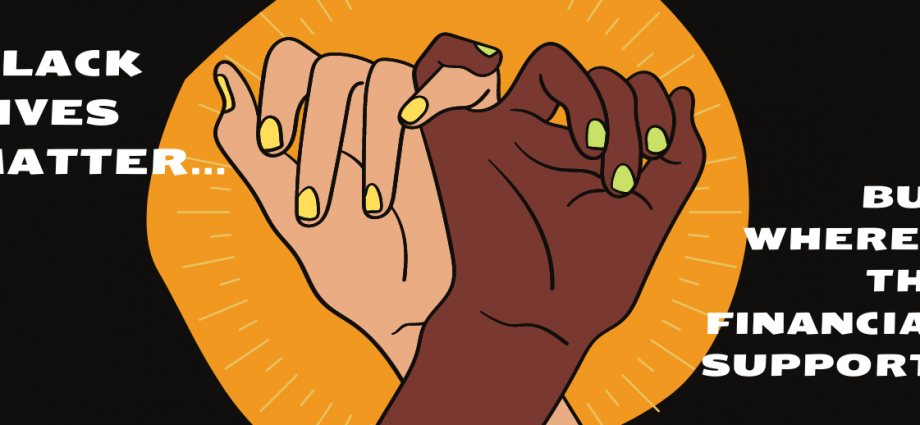Graphics by Rose Lee
The BRB Bottomline: The Black Lives Matter protests have shed light on the systemic racism which African Americans face. Although there is widespread support for equality for all, the evidence may suggest otherwise for Black-owned businesses. Here, we attempt to reveal if equality pertains socially and economically.
With the recent (as of the writing of this article) nationwide Black Lives Matter protests, the issues of police brutality and systemic racism against African Americans has re-emerged in the media. This resurgence has highlighted the double standard and prevalent societal inequalities which African Americans face, and has revealed the deterioration of race relations in America. According to a recent Gallup poll, “nearly 60 percent of those surveyed said that they were somewhat dissatisfied or very dissatisfied with the state of race relations in America.” However, despite their widespread dissatisfaction, many Americans have been proactive in advocating for change. Protesters of all ethnicities and backgrounds have converged in the midst of the COVID-19 epidemic, risking their lives in the pursuit of equality for all, while the phrase #supportblackbusinesses blows up and trends on nearly every social media platform.
Although the Black Lives Matter protests have drawn widespread media attention to racial injustice, many Black business owners are continuing to suffer economically from the effects of the COVID-19 pandemic and systemic racism. For example, the federal government’s Paycheck Protection Program (PPP) is a system designed to provide loans to small businesses to help keep workers employed during the COVID-19 pandemic. However, a recent study conducted by the National Community Reinvestment Coalition (NCRC) has revealed an alarming discrepancy between the funding available to Black-owned small businesses and White-owned small businesses which has been exacerbated by COVID-19 (this discrepancy was apparent amongst Black and White-owned small businesses even before the emergence of COVID-19). The study used Black and White matched-pair testers (a pair of testers who have similar profiles but are different races) to apply for a PPP loan from 17 banks in the Washington D.C. area. In fact, the researchers even gave each Black borrower an edge in their financial profiles than their White counterparts. Their findings revealed 13 banks treated the White PPP loan applicant better, while the remaining 4 banks’ treatment weren’t significant enough to violate fair lending laws. However, from the 13 banks, “matched-pair testers experienced different levels of encouragement to apply for loans, different products offered and different information provided by bank representatives.” Exacerbating this bias against Black-owned small businesses, the federal government has released unreliable demographic data about its PPP loans, even though the Treasury department has been collecting loan data for years prior to the COVID-19 pandemic.
This unjust inability to acquire capital is not a novel issue for Black business owners. Even prior to the COVID-19 pandemic, Black business owners have experienced staggering discrepancies when attempting to acquire loans. According to a 2017 report from the Federal Reserve, Black business owners had a loan approval rate of 46.6% compared to an approval rate of 75.3% for White business owners. This statistic reveals Black entrepreneurs face fewer chances of success than a coin’s toss of being approved for a bank loan, with the odds literally against them. Even more discouraging, “only 1% of Black business owners see their request for a bank loan approved in their first year of business.” Additionally, Black entrepreneurs possess some of the lowest support from venture capitalists and angel investors. A recent study conducted by RateMyInvestor and DiversityVC actually found that, “just one percent of venture-backed founders were Black.” In stark contrast to this alarming statistic, nearly 80% of venture-backed founders were White.
Some corporations, such as Netflix, Pepsi, and PayPal, have attempted to bridge the economic divide which separates Black and White-owned businesses. For instance, Netflix’s decision to reallocate $100 million of its cash holdings to financial institutions which serve Black communities is a step in the right direction. Meanwhile, Pepsi has pledged to invest “more than $400 million over 5 years to lift up Black communities,” while PayPal has also committed to allocating $530 million in support of Black businesses. Furthermore, the Billion Dollar Roundtable (BDR), a non-profit organization which recognizes companies which have invested at least $1 billion with minority and women-owned businesses, has served as a launchpad for established, recognizable companies, such as Apple, Microsoft, and AT&T to invest in and support minority communities.
Although much has been done to combat the issue of racial and economic inequality which minorities face, more is necessary. As a result of the biases against Black-owned small businesses and their inability to receive a sufficient PPP loan, bank loan, or venture capital funding, it should be no surprise that a reported “41% of black-owned businesses have been shuttered by COVID-19 compared to just 17% of white-owned businesses.” It seems apparent that Black-owned small businesses will need more support than PPP loans, bank loans, or venture capital will be able to provide to stay afloat. The Black Lives Matter protests have helped to rally support for social equality for Black people throughout America, but actions speak louder than words. Black businesses, such as some on this list, need economic support now more than ever to stay operational. If nothing is done to support these businesses, not only will the racial wealth gap between Americans be exacerbated, but vital contributions to American society and culture will perish.
Take-Home Points
The Black Lives Matter protests have drawn widespread support for social equality for all. Economically, however, Black business owners continue to face rampant discrimination during the COVID-19 pandemic. Although there have been attempts to rectify this discrepancy, more needs to be done to support economic equality for Black entrepreneurs.


Excellent points